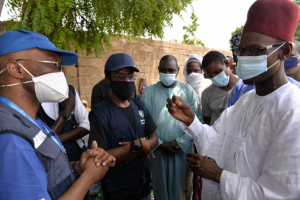Nigeria rallies over 7000 traditional leaders against COVID-19
Abuja, 12 March, 2021 - As the second wave of COVID-19 affects the global health and economic community, the World Health Organization (WHO) is supporting government to engage strategic stakeholders as part of concerted efforts to reverse the trend of the pandemic. This engagement builds on the lessons learned from the critical role played by traditional and religious leaders in the achievement of a polio-free status in Nigeria.
“What we did during the polio eradication initiative is a testimony of our capacity to mobilize, sensitize and convince our communities in support of any public health interventions in Nigeria,” Alhaji Idris Musa. Giwa community leader in Abuja,
Recently, with WHO’s support, government engaged 7,350 traditional and religious leaders across 11 priority states to execute community-based interventions including sensitization for voluntary testing, survivors’ declaration of status during heroes’ campaign, voluntary declaration of contacts by confirmed cases and adherence to preventive measures.
“I have personally taken part in such engagements with traditional rulers, religious leaders, community leaders and political leaders to encourage people to turnout and reduce hesitancy. I believe that once the vaccine roll out starts and the publicity is sustained, hesitancy will gradually reduce and people will voluntarily turn up for it”, Dr Osagie Ehanire said.
Leveraging the engagement of traditional leaders for polio eradication
Since 2009, the key role played by traditional leaders in Northern Nigeria under the auspices of Northern Traditional Leaders Committee for Polio and Primary Health Care (NTLC) remains one of the top strategic partnerships that saw the end of polio in Nigeria. According to Professor Oyewale Tomori, Chairman, Expert Review Committee on Polio Eradication in Nigeria, neglecting such powerful partners within the communities would have probably been the biggest mistake in the polio eradication initiative.
“We soon figured out that even with full government support, we could not reach certain communities without engaging traditional leaders,” Professor Tomori said. “As soon as we brought them on board with help from NGOs and some politicians, popular resistance to the vaccination campaigns disappeared.”
His advice to global health partners: “Get the local community to own the programme, explain to them that this is for you. Talk to them, ask them what they need, and work around giving it to them.”
Impact of traditional leaders’ engagement on COVID-19 response
In Kwara state, the traditional leaders’ engagement resulted in an increase in individuals presenting for COVID-19 testing. “Shortly after our sensitization of traditional leaders in Kwara state during epidemiological week 46 in 2020, testing increased from zero to 875 by week 52,” said WHO State Coordinator, Mr Mustapha Katibi. “So far this year, weekly tests have remained higher than 300 samples, thanks to the ongoing sensitization efforts in the communities by community and religious leaders” added Mustapha.
In Sokoto, WHO State coordinator, Dr Habibu Yahya reaffirmed that the increase in community testing was associated with the sensitization and engagement of the traditional and religious leaders led by the Sultan of Sokoto, Muhammadu Sa'ad Abubakar. “Since the engagement of the traditional leadership of Sokoto under the Sultan, our community testing increased from less than 100 as of September 2020 to over 200 in the current month,” said Dr Habibu.
His Royal Highness (HRH), Esau Mamman a traditional leader in Bassa Local Government Area (LGA) of Plateau State commended WHO for supporting government to engage traditional leaders as a holistic approach. He was confident that these efforts would address the challenges of misconception, denial of COVID-19 disease, low risk perception, and stigmatization in the communities, all of which hugely affect COVID-19 prevention and control.
WHO Country Representative/Head of Mission, Dr. Walter Kazadi Mulombo, is optimistic that engaging the traditional and religious institutions will enhance community acceptance of COVID-19 vaccine. “As Nigeria introduces COVID-19 vaccine amidst low risk perception, myths and doubts about the reality of the disease among the populace, the engagement of traditional leaders will be vital to address these among other erroneous impressions.
Technical Contacts:
Dr Chima Onuekwue; Email: onuekwec [at] who.int (onuekwec[at]who[dot]int); Tel: +234 803 535 4876



